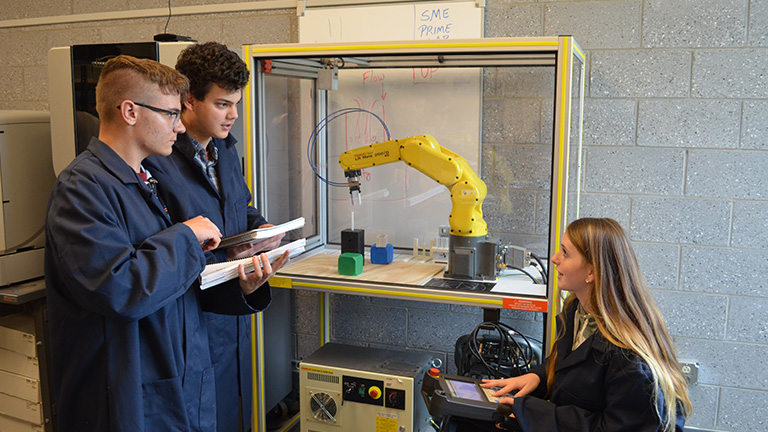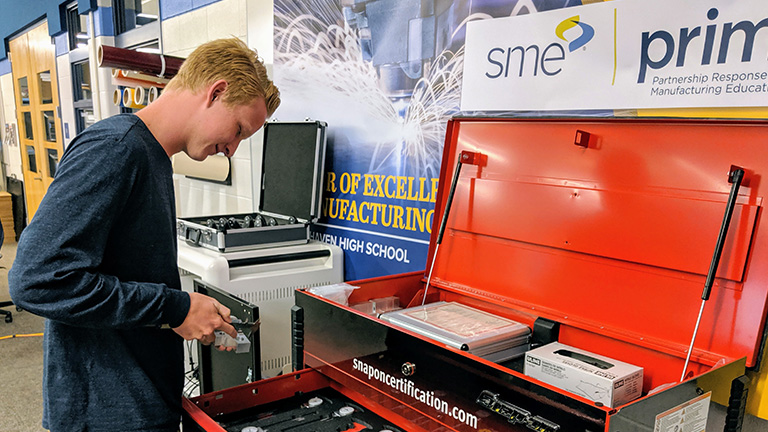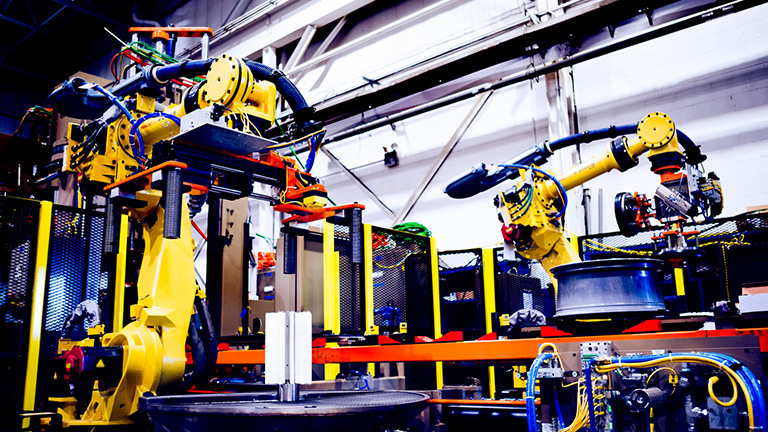 As we enter the so-called Fourth Industrial Revolution also known as Industry 4.0, it’s imperative for high schools to keep pace with the skills they teach. Schools that are part of the SME Education Foundation’s PRIME® (Partnership Response in Manufacturing Education) initiative do just that, working with industry to tailor manufacturing curriculum to high school students as they travel along their manufacturing career pathways.
As we enter the so-called Fourth Industrial Revolution also known as Industry 4.0, it’s imperative for high schools to keep pace with the skills they teach. Schools that are part of the SME Education Foundation’s PRIME® (Partnership Response in Manufacturing Education) initiative do just that, working with industry to tailor manufacturing curriculum to high school students as they travel along their manufacturing career pathways.
What general skills are workers going to need as they ply their trades during the Industry 4.0 era? According to the World Economic Forum, the Top 10 skills in 2020 will be:
- Complex problem-solving
- Critical thinking
- Creativity
- People management
- Coordinating with others
- Emotional intelligence
- Judgment and decision making
- Service orientation
- Negotiation
- Cognitive flexibility
One of the biggest changes from the forum’s 2015 list is that creativity will become one of the top three skills workers need to be successful in a smart factory. And that’s because with the avalanche of changes associated with Industry 4.0 — including new technologies, new products and new ways of working — workers are going to have to become more creative in order to benefit.
SME PRIME schools give high school students a head start when they enter the manufacturing workforce, as they inspire them to use and test the skills they learn in the classroom during regular class projects as well as occasional special assignments — such as an underwater robotics project that Grand Haven High School PRIME students worked on with the help of Shape Corp.
PRIME students are also targeted for participation in our Student Summit Event Series, where they can take part in hands-on challenges. In both cases, students utilize not only creativity, but most of the other Top 10 skills cited by the forum.
 But inspiration is just the first stepping-stone on the pathway to a manufacturing career. The next thing high school students need to do is prepare, and PRIME schools provide them with the perfect place to do it. At PRIME schools, students acquire necessary manufacturing skills through tailored curriculum and training informed by the manufacturers in their local communities.
But inspiration is just the first stepping-stone on the pathway to a manufacturing career. The next thing high school students need to do is prepare, and PRIME schools provide them with the perfect place to do it. At PRIME schools, students acquire necessary manufacturing skills through tailored curriculum and training informed by the manufacturers in their local communities.
Collaboration by representatives of education, industry and government is also important in developing students’ skills so they can prosper within Industry 4.0 roles. In fact, panelists at a Brookings conference on the global context of modern manufacturing repeatedly emphasized the crucial nature of cross-sector collaboration.
During a Q&A session, one audience member asked how governments and companies were encouraged to engage in the high school and college education component of workforce development. The answer? An example of collaboration between the Delaware Department of Education, Delaware Workforce System and Delaware Manufacturing Association.
PRIME schools are a prime example of industry-education partnerships. For example, the SME Education Foundation formed a partnership in 2018 with the National Coalition of Certification Centers (NC3), Snap-on Inc. and the L.S. Starrett Co. to provide custom training in precision measurement for schools in the SME PRIME network. The partnership is providing participating schools with the equipment, tools, curriculum and teacher training necessary to offer certification in precision measurement and quality control, as well as student credentials.
 It’s definitely worth the effort, as millions of jobs are going unfilled. And it will only get worse as more baby boomers retire, taking their expertise and experience with them.
It’s definitely worth the effort, as millions of jobs are going unfilled. And it will only get worse as more baby boomers retire, taking their expertise and experience with them.
According to an article in USA Today in October 2019, the problem is prevalent in most U.S. states. In fact, there are more jobs than people looking for them in 39 states, according to a Stateline analysis of June 2019 hiring and employment data from the federal Bureau of Labor Statistics.
In August, the number of national job openings was 7.1 million compared with 6 million unemployed jobhunters. And many surveys have reported that employers are unable to find skilled workers.
In regard to PRIME schools, so far we’ve talked about how they are inspiring and preparing students for manufacturing careers during the Industry 4.0 era. But what if students can’t afford the higher education that would make their dreams come true? PRIME has students covered there, too. The SME Education Foundation annually awards millions in scholarships to hundreds of high school seniors, undergraduates and graduate students pursuing two-year, four-year or advanced degrees in manufacturing or engineering.

